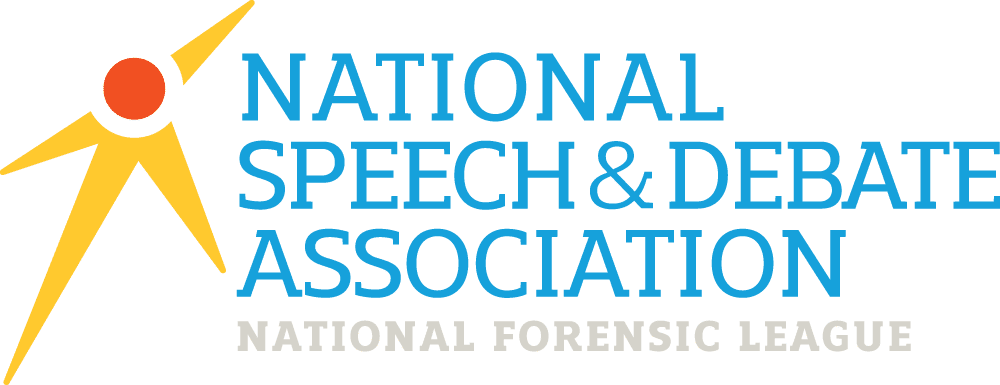The National Speech & Debate Association (NSDA), founded in Ripon, Wisconsin in 1925, provides an honorary society that recognizes student participation, achievement, and longevity in speech and debate activities, including in service (such as a speech to a community organization) as well as one-act plays and Thespys.
Compatible with WISDAA Speech, students earn NSDA honor society merit points each time they participate, based on their festival score each round. This allows them to earn national recognition for local participation.
NSDA also provides resources for coaches and students, and offers a signature National Tournament every June, in which students qualify through an NSDA district qualifying tournament (by competing in NSDA “main events” – see table below for a list – or a school can register up to two entries in Supplemental events* without those students competing to qualify ahead of time).
There are two NSDA districts in Wisconsin: Northern Wisconsin and Southern Wisconsin. When a school joins, they are assigned to an NSDA district, and that district chair will communicate with the coach, similar to the way WISDAA district chairs engage schools.

Festival Ratings to NSDA Rank Conversion #
WISDAA Speech festivals (or conference/invitational meets using WISDAA rules/festival format) can earn credit in the NSDA honorary society. NSDA already has a point conversation protocol (see table below) for festivals to help coaches know what “rank” to input for each round a student has participated in, in NSDA’s online points database when crediting students for their participation and achievement. Coaches simply enter the rank, and the points database calculates the NSDA merit points earned for the honorary society. This applies to both middle and high school contests.
| HS Points Earned per Round | ML Rating Earned per Round | Rank to Input in NSDA Database | HS Points Earned (Main Events) | HS Points Earned (Non-Main Events) | ML Points Earned (Non-Main Events) |
|---|---|---|---|---|---|
| 20 | 1 | 6 | 5 | 3 | |
| 19 | Excellence | 2 | 5 | 4 | 2 |
| 15-18 | 3 | 4 | 3 | 1 | |
| 11-14 | Merit | 4 | 3 | 2 | 1 |
| 8-10 | 5 | 3 | 1 | 1 | |
| 0-9° | None° | ||||
| ° Severe deficiency, and therefore, not worth any points | |||||
Different Categories/Competitive Events #
Depending on Speech categories (what NSDA considers “competitive events”) in which students participate, NSDA may award a higher or lower level of honor society merit points. This is based on which events are “NSDA main events” in which students can qualify to the National Tournament from their local, NSDA district level. Double-entry and virtual rounds all can be recorded; each individual round and category is its own entry in the database (i.e., a student who participates in both Poetry Reading and Solo Acting Serious would have two points database entries for each round at a three-round festival, for a total of six database entries).
| WISDAA Category | NSDA Main Event Counterpart | Non-Main NSDA Events |
|---|---|---|
| Expository | Expository / Other Speech | |
| Extemporaneous Speech | Extemporaneous Speech | |
| Farrago | Program Oral Interpretation | |
| Group Interpretive Reading | Duo Interpretation (if 2 students) | Group Interpretive Reading / Other Speech (if >2 students) |
| Impromptu Speech | Impromptu / Other Speech | |
| Informative/Demonstration | Informative | |
| Moments in History | Informative | |
| Non-Original Oratory | Declamation / Other Speech | |
| Oratory Speech (HS) Persuasive Speech (ML) | Original Oratory | |
| Play Acting | Duo Interpretation (if 2 students) | Play Acting / Other Speech (if >2 students) |
| Poetry Reading | Poetry / Other Speech | |
| Prose Reading | Prose / Other Speech | |
| Radio/News Reporting | Radio / Other Speech | |
| Readers Theatre (ML) | Duo Interpretation (if 2 students) | Readers Theatre / Other Speech (if >2 students) |
| Solo Acting Humorous | Humorous Interpretation | |
| Solo Acting Serious | Dramatic Interpretation | |
| Special Occasion | Special Occasion / Other Speech | |
| Storytelling | Storytelling / Other Speech |
Participation in school play productions and/or WISDAA’s One-Act Theatre festival series also can earn students NSDA merit points in the “Service” category.
NSDA Supplemental Events #
NSDA allows any NSDA member school to bring up to two entries to the National Tournament in any “Supplemental” event/category (supplementals at the National Tournament are events students can participate in after they have been eliminated from competition, following prelims. Those categories are:
- Expository Speech (just like WISDAA Expository, but must be memorized)
- Extemporaneous Commentary (a draw category, like Extemp, but more of a 5-minute editorial treatment of a current events issue, where opinions must be backed by solid information as in Extemp).
- Poetry Reading (like WISDAA’s, but 5-minute time limit)
- Prose Reading (like WISDAA’s, but 5-minute time limit)
- Storytelling (like WISDAA’s, but 5-minute time limit and student may or may not be seated)
- Extemporaneous Debate (an impromptu approach to debate, similar to what WISDAA offers as Worlds Schools Debate in our online debate programming, only just one student, and a much shorter round)




